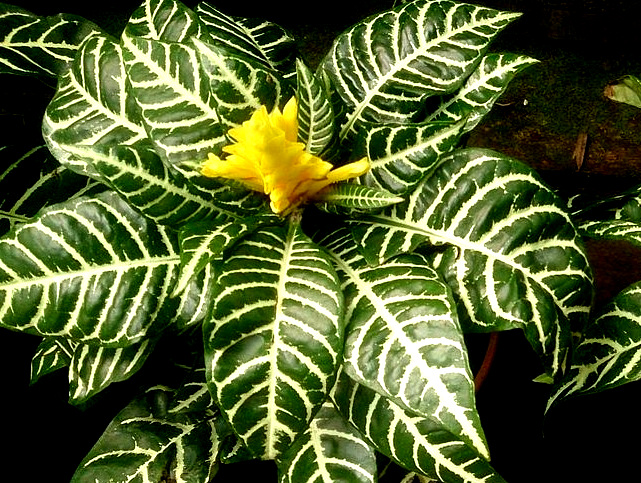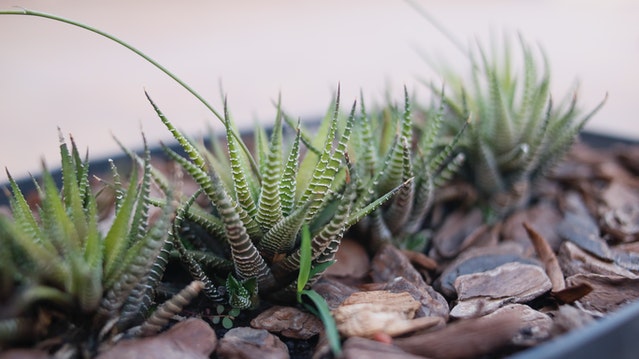Zebra plant is a slang name for two different plants actually:
- Haworthia fasciata, which is a succulent similar to Aloe in appearance.
- Aphelandra squarrosa, which is a common house plant native to tropical areas of Brazil.
Both of these plants are popular all around the world, and I have grown both in the past, having cats around the house. In this post I will clarify whether both plants are safe for cats, and also describe my personal experience with having cats and these two plants in the same living space.
Let me start with a quick answer: Both Zebra Plants (the succulent and the tropical plant) do not contain any chemical compounds toxic to cats. Hence when it comes to ingesting part of the plant by accident, your cat isn’t going to experience any health issues… As it is almost always the case though, a simple answer isn’t enough to clarify all possible risks and things you should consider when having a cat and a zebra plant (whichever one) in your home. Let’s have a look at them now.
Cats aren’t attracted to Zebra plants
The cats I had around the house back in the day were curious animals. They liked to explore the house and the garden, but zebra plants never captivated their imagination. Sure, I saw them walk around the plants, but they never really stopped to taste them, or lick them, or whatever. It seems that scents and colors of these plants aren’t particularly attractive to cats.
What I try to say here is that unless you let your cat starve, or unless it has no other toys or points of interest in the house, it just won’t mess around with your Zebra plant. I think this is good to know, because especially the Zebra plant from tropical areas is hard to grow, and the last thing you want to see is your cat damaging the leaves or over-throwing the pot with the plant. I guess this is +1 for having these plants at home, for every cat or dog lover.

If ingested in huge quantities, zebra plant (like any other plant) can cause your cat some gastrointestinal issues
Cats are obligate carnivores, and they won’t normally feast on plants. They may instinctively eat moderate quantities when experiencing some discomfort in their stomach (just like dogs do), but in normal conditions they aren’t going to eat the entire plant or anything similar.
Having said that, if you got some crazy idea, for example that instead of throwing a wilting zebra plant away you will cut it to small pieces and give your cat to eat (mixing it with milk for example), and it eats a lot of it, it can experience some stomach cramps and similar issues. But Zebra plant isn’t here to blame–your stupidity is. Cats should not eat any plants in big quantity. If they do so, or are forced to do so (for example when starved by their owner), bad things may happen. Keep it on your mind. Give your cat what it needs, and you won’t face any issue.

Fertilizer on leaves of the Zebra plant can be a game changer
Zebra succulent doesn’t need any fertilization, but the fragile beautiful plant from the tropical areas of Brazil does, and some people fertilize it with liquid fertilizers as often as every two weeks. All fertilizers contain some chemicals, and chemicals are bad for both people and animals. If you fertilized your Zebra plant just recently (within last 24hours for example) and your cat ate a few leaves, or played with the soil from the pot, there is a chance for a mild allergic reaction or even some more serious response. But it isn’t because of the plant itself–it is because of the fertilizer.
Luckily enough cats are smart animals with amazing smell. They will sniff everything before tasting it. And I can guarantee you that unless your cat lost the smell (a rare condition but it does happen) it won’t come even close to any plant that you recently fertilized. Still I wanted to cover this subject, just to make sure you see all angles, and can take measures if a rare incident happens.
Final verdict
Zebra plants (both Haworthia fasciata and Aphelandra squarrosa) are safe for cats. You do not have to worry if your cat roams around them. Maybe you can worry a bit about the plants–especially the fragile tropical aphelandra, since cats can sometimes overthrow it, and this plant bears badly with any for of stress. Other than that though, cats and zebra plants go well together, and you can enjoy the beauty and company of both at your home. Thank you for reading, and good luck with your pets and plants!
* Disclaimer: The content on this page is for general information purposes only. We are pet and plant lovers (and have real life experience with cats and succulents), but we aren’t medical professionals. Hence we make no representations or warranties of any kind, express or implied, about the completeness, accuracy, reliability, suitability or availability with respect to the information contained on this website for any purpose. Any reliance you place on such information is therefore strictly at your own risk. If you aren’t sure, contact a vet or other professional.
May also interest you:
